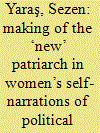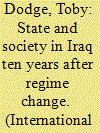| Srl | Item |
| 1 |
ID:
169041


|
|
|
|
|
| Summary/Abstract |
Women’s political empowerment has emerged as a particular field of interest in the late twentieth and early twenty-first centuries in Turkey. Women’s absence in many spheres of life, including the political sphere, has become one of the main references to discuss the patriarchal characteristics of the established regime. The AKP was founded in 2001 by those who claimed to distance themselves from the Islamist Refah Party. The AKP’s particular emphasis on the active roles and status of women within the party and their empowerment as active agents of politics was used as an important mark of distinction from earlier versions of political Islam. In this study, which focuses on the self-narrations of AKP female politicians nominated and elected in the 2009 local elections, the aim is to expand the discussion on how the AKP female representatives narrate their experience of this ‘political empowerment’ stressed in the AKP’s program and whether they subvert, transform or reproduce patriarchal authority.
|
|
|
|
|
|
|
|
|
|
|
|
|
|
|
|
| 2 |
ID:
119444


|
|
|
|
|
| Publication |
2013.
|
| Summary/Abstract |
This article examines the rise of a new authoritarianism in Iraq ten years after the invasion that removed Saddam Hussein. It traces the centralization of political and coercive power in the hands of Iraq's Prime Minister, Nuri al-Maliki. From his appointment in 2006, Maliki successfully moved to constrain the power of parliament and the independent agencies set up by the American-led occupation to oversee the state. He removed key politicians and civil servants who stood in his way. This authoritarian centralization reached its peak with Maliki's control of Iraq's special forces, its army and its intelligence services.
The article analyses the civilian institutions of the state, concluding that political corruption has greatly hindered their reconstruction. The result is an Iraqi state with an over-developed armed forces, very weak civilian institutions and a dominant prime minister. Against this background, the sustainability of Iraqi democracy is in question. The article concludes by assessing the ramifications of Iraq's postwar trajectory for military interventions more generally.
|
|
|
|
|
|
|
|
|
|
|
|
|
|
|
|